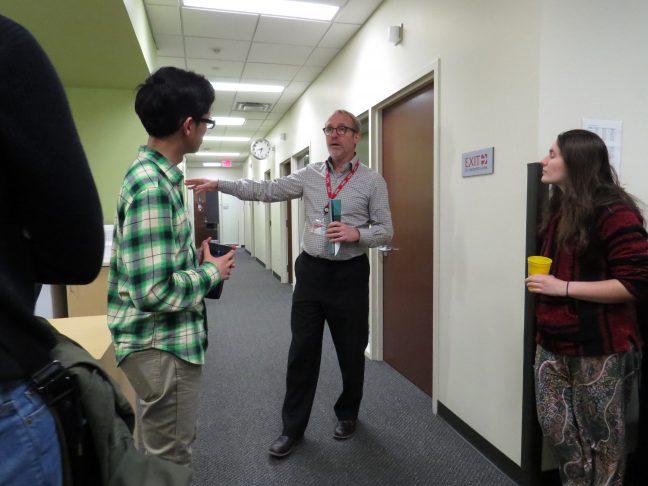One day after Gov. Scott Walker announced a state budget that would potentially affect how the group allocates fees, the Student Service Finance Committee toured the University Health System facility in anticipation of its budget hearing.
Approximately 85 percent of UHS’s budget comes from segregated fees, said Bill Kinsey, director of Medical Services at UHS.
“Our mission really is to enhance learning here on campus, and that gives just slightly a different flavor to how a medical clinic is run,” Kinsey said. “We’re here to enhance your health, but we’re really here also to get you back to class, get you feeling well enough to be able to study and pursue your academic pursuits.”
Kinsey and other members of the UHS staff explored the clinic’s primary care, immunizations, mental health, physical therapy, environmental health, nutritional health and sexual health services.
Approximately 34,000 people — about 250 a day — visited the primary care clinic last year, Kinsey said. The clinic is currently dealing with many primary care issues, especially with the high number of cases of influenza at this time of the year.
Fatigue, anxiety and other mental health issues are some of the other major issues UHS handles, Kinsey said.
To address limited individual counseling sessions, UHS plans to increase its funding request for mental health services.
The co-interim directors for Mental Health Services, Andrea Lawson and Angela Janis, outlined the services available to students without paying fees.
Currently, UHS policy caps individual consultations at 10 visits per year for both undergraduate and graduate services, though it does allow uncapped group consultations, informal counseling and services forat-risk students.
“We recognize that crisis happens, and you’re not going be able to know if you’re going to need that, so that’s outside the [capped individual] sessions,” Lawson said.
Kinsey said UHS professionals are proud how they’ve advanced collaboration between medical and mental health services over the past year.
When students come in for simple primary car, but then present other issues like extreme stress, they can immediately meet with a psychologist to learn basic information about how to deal with those issues.
“It’s really, I think, a very efficient way to deliver service,” Kinsey said. “If we can give you multiple services within the same visit, we really see that as a win-win.”
SSFC members also toured facilities for physical therapy, massage and acupuncture, though those services are not free to UW students and thus not covered by segregated fees. Athletic training, however, is covered by segregated fees.
UHS also foresees some remodeling and is considering many suggestions for how to use both extra waiting room space and space newly vacated space by the pharmacy, said Arnold Jennerman, director of administrative services.
End Violence on Campus, UHS’s program for addressing sexual assault issues, is also slated to be moved to a more private location within the building.
UHS also prescribes birth control as part of its services to UW students.
“We do it so often that our nurses work under protocol,” Kinsey said.
Members also asked about increasing free contraceptives beyond condoms to include female contraceptives, which Kinsey said was worth discussing.
UHS strives to expand mental health services despite financial restraints
“It really does get to the heart of a question we talk about every day here at UHS, how do we serve every student on campus?” Kinsey said.
The Sexual Health Clinic provides screening, diagnosis and treatment for most sexually transmitted infections, according to UHS’s website. Counseling on HIV and STI prevention and risk reduction is also available.
Kinsey said UHS provides pre- and post-exposure treatment for high-risk HIV scenarios.
Student health fees came to $212.26 per semester for each UW student in the 2016-17 academic school year. These and other services will be considered at UHS’s next SSFC hearing.


